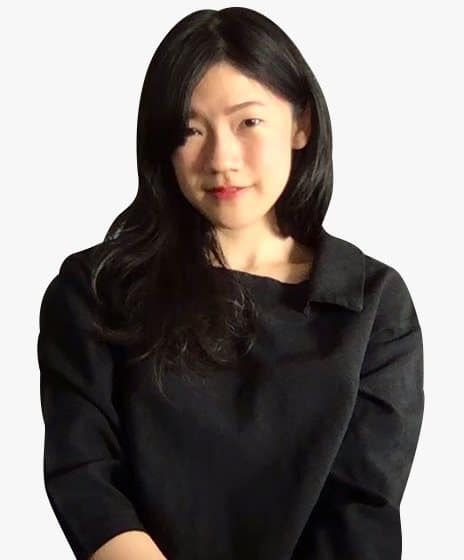I remember the day Ahrefs’ CMO Tim told me I was “now in charge of podcast sponsorships.”
I said: “Awesome!!!”
I had never listened to a podcast in my life.
Naturally, the rest of my day was spent getting real intimate with Google. We covered important topics like:
- What is a podcast;
- Why are podcasts popular;
- Podcast ad examples;
- Standard podcast formats
You get the gist. Here’s an overview of what Google told me that day:
- Podcasts are highly‐targeted. There’s a dedicated, top‐quality podcast for every imaginable niche out there, from true crime case reports to discussing Buffy the Vampire Slayer. This also means that we can reach just about any audience we want to.
- Podcast listeners are among the most engaged and loyal audiences ever. The nature of the medium means that podcast hosts speak directly into our ears for over 30 minutes at a time, and many listeners build a strong affinity with the content and show host. Makes sense!
- The traditional success metrics are impressions and downloads per show. Obviously, the higher the numbers, the better.
- Podcast advertisers generally choose to have a dedicated landing page and a promotional offer for each podcast they sponsor – this is how they track conversions and the overall success of their ads.
I also learned that there are three main categories of ads in podcast sponsorships:
- Pre‐roll: ~15–30 second ad at the start of the show.
- Mid‐roll: ~1-minute ad in the middle of the show.
- Post‐roll: ~15–30 second ad at the end of the show.
As a general rule, mid‐rolls are the most expensive, followed by pre and post‐rolls.
Cool, I thought, this all sounds pretty straightforward.
You know how the story goes by now: I was quite wrong.
Over the course of half a year, I trial‐and‐errored my way through all the things that Google doesn’t tell you (at least, until this page starts to rank for podcast‐related terms.)
The good news? I’m about to share everything we learned with you.
Let’s start right from the beginning, shall we?
First Attempt: $14,200 Spent
While I’d personally never listened to a podcast before 2018, that isn’t true of 44% of the US population.
There’s a huge, thriving community of podcast listeners who avidly follow their favorite hosts, discuss takeaways from the latest episodes and recommend shows to each other. Many people even make a good living off podcasts now!
Taking notice of all of this, Tim decided to pay this channel some attention over a year ago.
Our first experience with podcast advertising: Tim spent ~14k USD to promote a special offer on five different podcasts, tracking traffic and leads by creating a specific landing page for each show.
Here are the results:
Budget: $14,200
Podcasts sponsored: 5
Hack the entrepreneur by Jon Nastor
PNR With This Old Marketing by Joe Pulizzi and Robert Rose
“Mad Marketing” & “The Hubcast” by Marcus Sheridan & George Thomas
“$100 MBA Show” by Omar Zenhom
Pageviews: 339
Trial signups: 11
The conclusion, in Tim’s own words:
It was quite foolish to expect a substantial ROI from “cold advertising” a complex product like Ahrefs with a 30‐second pre‐roll in a 30‐minute podcast.
This is probably a good time to mention what Ahrefs does.
We’re an industry‐leading SEO toolset. We help you get more website traffic from search engines and increase sales. We’re also very well known for our blog, which at the point of writing, sees close to 175K organic traffic a month.
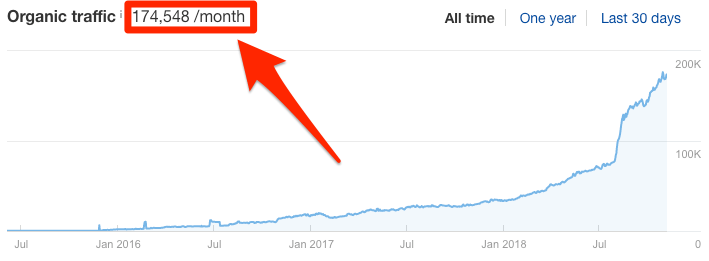
a screenshot of our organic traffic growth via Ahrefs’ Site Explorer
Tim’s first thought was that we’d never sponsor podcasts again (and no wonder; it cost us almost $1.3k for each trial signup!)
But then he noticed something. While attending conferences and networking with people, many of them told him that they’d heard about Ahrefs in podcasts.
Sometimes an existing user would mention that they were happy to hear about us on their favorite show; sometimes a random person (not even in marketing) would remember us from an old podcast mention. Even if they didn’t convert at the time, they thought that Ahrefs was kind of cool—and this brand recognition stayed in the back of their mind.
That’s when it all clicked.
We were going about it all wrong—rather than being a tool for lead generation, podcast advertising is a tool for gaining exposure and brand awareness.
I wish the rest were history.
Second Attempt: $37,775 Spent
Armed with Tim’s findings, I set to work with a new understanding of how podcast advertising fit into our marketing strategy.
These are the lessons I learned.
Get in early, because the “big” podcasts are always full.
I began by creating a spreadsheet of all the podcasts I’d reach out to.
It was glorious. I looked for recommendations on Slack channels and Facebook groups. Trawled through “Best Podcasts” listicles and Reddit threads. Sorted the list by category: SEO, digital marketing, entrepreneurship, finance, and so on and so forth.
Then came the fun part: making actual contact and whittling them down.
Many podcasts don’t explicitly state that they accept sponsorships on their websites, so you’ll have to do a manual check.

Usually, the top podcasts are open to sponsorships and openly broadcast this. Many even have dedicated pages and “sales pitches,” like this one from Entrepreneurs on Fire.
Just one problem: these podcasts are really, really popular.
So much that when I started contacting them around mid-April 2018, many were already fully booked for the quarter (some even through the year!.)

Note: This is actually a good thing because it means that these podcasts care about the quality of their content. Nobody wants to listen to a podcast that’s chock full of ads. You don’t want to sponsor a podcast that’s squeezing you in with four other sponsors, either.
Back to the topic.
After securing some positive responses, I found out that…
Pricing is completely arbitrary.
Some podcasts are completely transparent with their pricing structures and publish this on their websites.
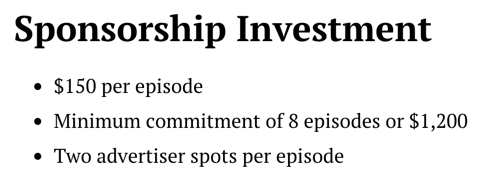
Unfortunately, most aren’t. You’ll have to contact each podcast and ask for their current rates.
Oh, and many podcasts offer set “packages” for sponsorship, where they include things like email newsletter mentions of your brand, social media promotion of the episode, etc.
So, how much does podcast sponsorship cost?
I wish I could give you a more concrete answer than “it depends,” but I really can’t. The shows set the pricing (this is sometimes negotiable, especially if you’re looking to sponsor for a longer period).
This can range anywhere from $300 per episode to…well, see for yourself.
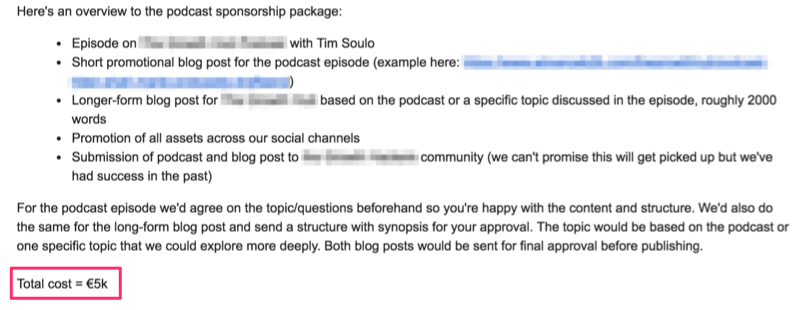
This is the full list of podcasts that Ahrefs ended up sponsoring this year, along with how much it cost us.
| Podcast | Sponsorship | Cost |
|---|---|---|
| Marketing Over Coffee | 10 shows in Q3 | $16,750 |
| La Maquina Del SEO | 24 shows in Q3 | $6,000 |
| TMBA | 4 shows in Q4 | $3,750 |
| Listen Money Matters | 6 shows in Q4 | $5,075 |
| Moneylab | Full month of October | $5,000 |
| SEObits | 8 shows in Q4 | $1,200 |
*If you’re looking to sponsor these podcasts, their rates may change from the time of publishing.
Some podcasts offer contracts to be signed, while others simply send an invoice. You can request a contract if you’re uncomfortable with not having one.
Classically, ad placements don’t vary much.
Remember what Google told us about pre, mid and end rolls?
This is generally true, although they’re not always all available (or labeled as such.)
Get in touch with your chosen podcast, and you’ll instantly find out what the deal is for each show.
Here’s an example:

Whether or not they call it a midroll, this offer is exactly that.
The ads themselves, on the other hand, vary wildly.
Most podcasts will ask you to provide an advertisement “script”. These are usually the ones that offer pre, mid and post‐rolls.
You’ll need to prepare some pointers or paragraphs (follow each podcast’s instructions) for the show host to read off. You can either create it yourself or get someone from your marketing team to do it.
Here’s an actual one I wrote:

Even while writing it, I found “ad reads” like these to be rather unauthentic—you can see that I was trying to get the podcast host to add their own spin on it and share their own experience with Ahrefs.
No matter how good a podcast host is, true enthusiasm for your brand is hard to fake. So I count myself lucky that I ran into John from Marketing over Coffee early on.
When I reached out to him, this is what he proposed:

This blew my mind: he can do that for us?!
Podcast hosts know their audience better than anyone else. Having them promote us in their natural voice, and in a completely organic, non-scripted way, was definitely the best way to go.
I jumped on board in a second, and that turned out to be a fantastic decision.
Podcast sponsorship is incredibly time‐consuming.
Let’s take a moment to recap everything we’ve learned so far.
These are the absolute basics of how to sponsor a podcast:
- Find a suitable podcast. Their audience and content tone should align with your brand’s.
- Reach out and learn about their pricing packages and availability.
- Decide on a price point, type of ad, timeslot and other miscellaneous items.
- Iron out the ad copy and delivery, along with other deliverables like your brand logo, newsletter copy, etc.
- Enjoy the shows when they air. Keep in touch to answer any final questions along the way.
Sounds time-consuming as heck?
It really is.
As you can probably tell at this point, there is A LOT of back‐and‐forth involved in sponsoring a podcast.
The more established a podcast is, the more rigid their processes are and the longer you’ll have to spend discussing things and ironing out details.
Be very prepared for some frustration and lots of lost time. It’s not anybody’s fault; sometimes things just don’t work out.

I’m mentioning this just in case somebody sees this article, decides that podcast ads are another “low-hanging fruit” type of marketing activity, and assumes that all you need to do is toss some money into it and sit back.
No.
Getting the Most From Your Advertising Spend
Since we decided to do away with conversion tracking, I had to get a little creative with how we went about handling our advertisements.
Here’s the highlight reel of how we got the most out of our budget.
Organic, not scripted, mentions
This is really important to us, and I find that results are the best this way.
This means that we give podcast hosts a free Ahrefs account, walk them through our tools (it’s ideal if they’re already familiar with us) and give them full control over all mentions of us and their placement in the shows.
This is the difference between a scripted sponsorship mention and a non‐scripted one.
Scripted:
Non‐scripted:
Not to say that scripted ads are bad, necessarily. In the clip above, Rebecca does an absolutely fantastic job of promoting us according to the script I provided. She’s enthusiastic, authoritative and even adds on some points of her own.
But when the podcast host is fully fluent with our tools and then given the freedom to promote us however they wish, the difference in both the depth of content and persuasive strength is quite clear.
Again, think of this as enabling the host to be your brand ambassador.
This has benefits beyond just higher quality mentions on their own show, by the way.
Proof: Matt Giovanisci of Moneylab went on other shows like Niche Pursuits and The Fizzle Show (episode 285) and raved about us there, too. We got a handful of new signups after. (You’re the best, Matt!)
Some of my favorite “ads” from the shows we’ve sponsored so far:
This epic long introduction from the guys at Moneylab:
Just another regular mention from the guys at Marketing over Coffee:
Giveaways + social media engagement
It seems that the current industry standard is for advertisers to set up a unique promo code and specific landing page for tracking purposes, as well as to give people a nice incentive to convert.


Since Ahrefs never runs any promotions or discounts and we weren’t looking at podcasts as a direct lead generation channel, we figured out another way to spice up our podcast mentions.
What we do instead is run Ahrefs account giveaways with a tweet‐to‐enter mechanic.
It’s a win‐win for everyone involved: the podcast host gets a great prize to boost audience engagement and some extra social shares. We get extra attention to our message and a way to gauge if the ad resonated well with that show’s audience.
And of course, listeners love the chance to win a subscription to the tool they heard about on the show.
This started out pretty simple: listen to the podcast, then tweet @ahrefs and @podcast to be entered into the draw.
Hey @mktgovercoffee, enter me to win a free @ahrefs account. Love the show! Thanks guys.
— Kevin Steffey (@steffeyk) July 18, 2018
After a couple of weeks of this, I got a little smarter and began playing around with the entry format.
Right now, I like asking people to convince us as to why they should win the account. It makes for entries like these:
My papa always said “Don’t work hard, work smart!”…I can write countless articles and hope some get some traffic (hard), or I can use @ahrefs to learn which topics people are actually searching for (smart!) #moneylab
— Brent Wehmeyer (@brentwehmeyer) October 10, 2018
@ahrefs – I need a free year of ahrefs because I recently acquired two sites where the traffic charts look like this. 😬😬😬
A setback is just a set up for a comeback, right? #MoneyLab
cc: @MattGiovanisci @andyfieb pic.twitter.com/nGgOyOUjd6
— James Sowers (@jamesrsowers) October 22, 2018
People are clearly excited to win an account and know exactly what they’ll use it for—definitely a win for working with Moneylab.
This also ties nicely into…
Testimonials
We pulled off something really cool with John and Chris at Marketing over Coffee: we managed to get one of the winners of the account giveaways back on the show to give us a testimonial!
You can’t get much more authentic than this. Have a listen and see.
While this is a little difficult to pull off regularly, it’s a good example of the cool things you can do with the podcast medium.
Working with foreign‐language markets
Early on in our podcast venture, Andres Kloster from La Maquina del SEO (translated: The SEO Machine) asked us to sponsor his podcast—which is held entirely in Spanish.
It seemed like a great opportunity to bypass the huge language barrier we experience with the Latin American market, so I went ahead with an exclusive partnership.
It turned out to be a big success.
Nobody in the Ahrefs team speaks Spanish or is familiar with the market, so Andres and his team do all the groundwork for us.
Quick example: they source for and conduct interviews with SEOs from Spain that we’d otherwise never be able to form a connection with (Natzir Turrado, Ruben Alonso, David Ayala, José Márquez and Juan González Villa, to name some names).
They also create content for us in Spanish and distribute it to their audience, which gives us a lot of exposure.
Just look at these sweet engagement numbers for the September 2018 giveaway:
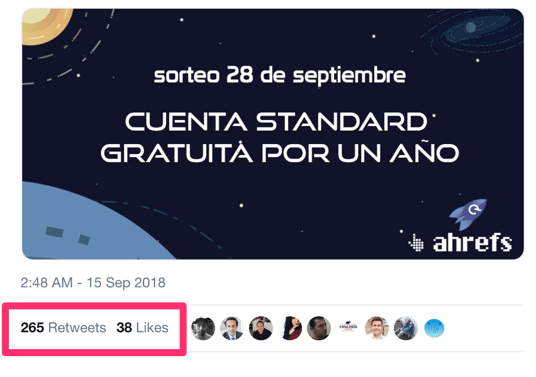
The #lamaquinadelseo hashtag on Twitter is really active, too, where Ahrefs is featured lots.
I’ve even noticed recently that Spanish speakers have started asking Andres questions about Ahrefs tools after listening to his podcasts.
Job well done in my book!
Gauging success
It’s not completely true that we’ve stopped all tracking of our podcast sponsorship efforts.
When you sign up for a paid trial with us, we have a mandatory field that asks where you heard about us. I keep a pretty close eye on this.
This is what things look like currently:
From July to October 2018, we’ve seen 126 paid trial signups from “podcast.”

Prior to these four months of active sponsorship, we record 99 signups from “podcast” in total, ever.

Some things to note:
- Our $37,775 spend includes shows we sponsored that haven’t aired yet;
- Sometimes people quote the podcast show itself or even the host’s name, so the actual numbers are higher;
- Ahrefs is often mentioned organically on non‐sponsored podcasts, so not all of these are due to sponsored mentions;
- We used to run a free trial instead of a paid one (no longer around too), which means it was easier to get signups in the past.
Yes, the numbers aren’t the most accurate. But this is enough to give us a good feel for what’s working and what isn’t.
You know the sponsorship is working when people say things like this:

Or they enter our giveaway with videos like this (this guy won the subscription.)
Hey @ahrefs, @MattGiovanisci and @andyfieb! This is why I deserve to win the light account.
Also, here is a youtube video to get some extra points.https://t.co/ZFmeoO9Xpk pic.twitter.com/m2iR0pOzXR
— Diego Vizcaino (@Y_Existo) October 26, 2018
Statistics like downloads and impressions are fancy, but they don’t count for much in the end (aren’t these numbers terribly easy to game, anyway?)
My main takeaway: it’s not always all about measurable ROI. If you look in the right places, you’re likely to see some other kind of magic at work.
Final Tips on Choosing a Podcast to Sponsor
The main thing to decide is whether you’d like to sponsor a “bigger” or “smaller” podcast. There are pros and cons for both (if your budget allows for it, feel free to experiment with both, of course.)
Bigger podcasts come with the benefit of a huge existing audience and lots of experience—they can really get your name out to an impressive number of listeners.
They tend to have broader topics, are extremely professional and pretty much guarantee the quality you’ll be getting, from timely communications down to the actual show production. On these shows, people might not become customers instantly, but it’s likely that they’ll make mental notes and might convert in the future.
Cons? They tend to be expensive and can be a little rigid. Since they have a dedicated team and processes in place (you often don’t even get to connect with the host himself at all), there’s zero room for flexibility – you work around their format. That’s the only way that you’ll be granted access to their audience.
My advice is: don’t be afraid to take a chance on a “smaller” podcast.
They may not have crazy impressive reach or download statistics to show you, but they’re often more affordable, more passionate, more willing to work with you and most importantly, generally have a super strong personal connection with their audience.
Also, look out for signs of enthusiasm and passion as early on as possible.
How excited the podcast host is about your product will translate directly into how excited their audience gets about you.
This is what you want to see:

Because this translates into mentions like this:
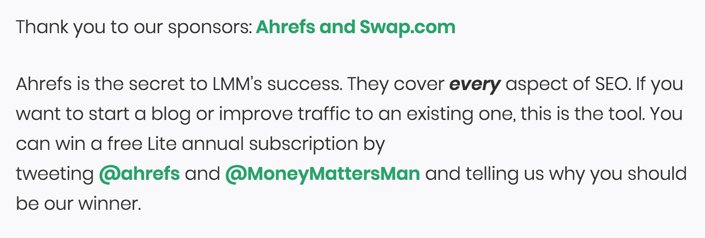
Another thing: “smaller” podcasts tend to be a lot more proactive and dedicated to making the partnership work for both of you, while “bigger” podcasts have brands lined up through the year just waiting for a sponsorship slot. They aren’t going to go out of their way to accommodate you.
This is the kind of email you’ll get from a more established podcast:

And this is one from a “smaller” one.

So: depending on your budget and resources, find a podcast that’s a good fit for you.
If you have lots of money and not much time, you’ll probably want to work with an established podcast that will take care of all the work for you.
On the other hand, If you have a million creative ideas and want the flexibility to experiment, look for a smaller one.
Over to You
I hope this post demystified a good bit of the podcast sponsorship experience!
To sum up: working with established podcasts feels a little more “pay‐to‐play”. Or to put it admittedly crudely, kind of like an audible version of Google Adwords.
Working with smaller podcasts, on the other hand, is a different experience that feels closer to influencer marketing.
Remember that there are countless ways to work with podcasts, from giving the hosts a specific message to promote to allowing them full control and fully enabling them to be brand ambassadors. Don’t pigeonhole yourself into thinking you can only “run some pre‐written ads.”
Have you tried sponsoring a podcast before? Did you have similar takeaways or a completely different experience? Have you experienced huge success sponsoring a particular podcast?
I’d love to hear your thoughts in the comments below.
P.S. (If you run a podcast and think your show would be a great fit for us, drop me a line!)


